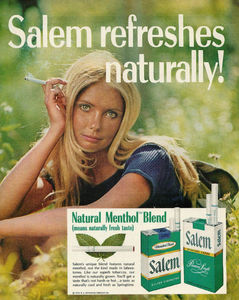The alleged pleasure of smoking is sometimes put forward in an attempt to counter the nanny state which says smoking’s bad for you. Here’s an example from Huffington Post (6 April 2011) by Christopher Mathias, ‘I love loosies’:
I love smoking. I like the way it smells, I like the way it tastes after a meal or with a cocktail, I like the way it fends off boredom, I like it on a hot, sweaty summer day and I like it on a cold, crisp, winter night…In the end, the ritual and routine of smoking, not to mention the nicotine, puts me at ease and relaxes me.
Note how Mr Mathias starts by saying ‘I love [sic] smoking’ but in the next sentence it’s downgraded only to liking it. That is, he claims to like the smell and taste of smoking after a meal or with a cocktail, respectively. He’s eaten a meal but apparently isn’t satisfied; he needs the taste of cigarette smoke in his mouth afterwards. What was wrong with the meal that it needed to be supplemented in this way? As for smoking with a cocktail, does this enhance the pleasure of the drink? Are we non-smokers missing something?
Then, he likes smoking on a hot, sweaty summer day and on a cold, crisp, winter night. But what about all the days and nights when these particular atmospheric conditions are not present? Of course, he smokes whatever the weather.
As for fending off boredom, he’s now thought up another reason for smoking. If this is true, how long would smoking fend off boredom for? Five minutes? And then what? Furthermore, the wonder drug, nicotine, is part of a routine and ritual for putting him at ease and relaxing him (what’s the difference?), but why is his life so stressful that he needs to do this repeatedly every day?
Unfortunately for Mr Mathias, the reality is that he can’t enjoy a meal or a cocktail or contemplate the beauties of nature, or indeed enjoy anything in normal human life, without a cigarette.
Then he says something that on the face of it is not unreasonable:
That I’m doing something physically harmful to myself is a choice I’m comfortable with and feel, as an adult, a choice I shouldn’t be punished for. People have the right to get fat and drink too much, and I should have the right to smoke without being taxed out of next month’s rent.
Although he thinks he’s making a choice to smoke, this isn’t the case: he feels compelled to do something he can’t afford (the context of the piece is a polemic against cigarette taxation) and which puts him at serious risk to his health, because he no longer has the choice not to do it: he’s become a drug (nicotine) addict.
Horrible life
Another spurious reason for smoking is offered by one Linda Tirado in an article titled, ‘This Is Why Poor People’s Bad Decisions Make Perfect Sense’, also in Huffington Post (6 December 2017):
I smoke. It’s expensive. It’s also the best option. You see, I am always, always exhausted. It’s a stimulant. When I am too tired to walk one more step, I can smoke and go for another hour. When I am enraged and beaten down and incapable of accomplishing one more thing, I can smoke and I feel a little better, just for a minute. It is the only relaxation I am allowed. It is not a good decision, but it is the only one that I have access to. It is the only thing I have found that keeps me from collapsing or exploding.
Why is this poor woman always, always exhausted and so often on the point of collapsing or exploding? She seems to have a horrible life, but is it really helped by smoking? Or could smoking be contributing to or even causing her problems?
What is undoubtedly true is that many people whom I’ve helped to escape from nicotine addiction feel much better when they permanently stop inhaling poisonous tobacco fumes into their lungs.
Text © Gabriel Symonds


Leave A Comment